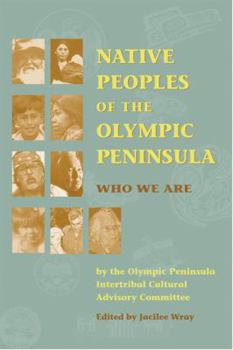Native Peoples of the Olympic Peninsula: Who We Are
Select Format
Select Condition 
Book Overview
The nine Native tribes of Washington State's Olympic Peninsula--the Hoh, Skokomish, Squaxin Island, Lower Elwha Klallam, Jamestown S'Klallam, Port Gamble S'Klallam, Quinault, Quileute, and... This description may be from another edition of this product.
Format:Paperback
Language:English
ISBN:0806135522
ISBN13:9780806135526
Release Date:June 2003
Publisher:University of Oklahoma Press
Length:185 Pages
Weight:0.65 lbs.
Dimensions:0.6" x 6.4" x 8.8"
Customer Reviews
1 rating
Olympic tribes, told in the voices of today's leadership
Published by Thriftbooks.com User , 16 years ago
This book provides a very good overview of the tribes of the Olympic Peninsula, both their history and contemporary life. It includes many interesting pictures from yesterday and today. Because there are really no other books on these tribes, and very few articles, this book provides a valuable resource for anyone interested in the area. The book includes one chapter on each tribe, written by tribal members under the auspices of the tribal government. As a result, the views of the tribes are inevitably positive. For the most part, they lack any self-criticism though the Quinault chapter admits to historically poor forestry practices. A concluding chapter providing an outside perspective on the tribes as a group might have fleshed out the book nicely, though I can understand the tribes' desire to tell their own story in their own words. The voices make these tribes come across as "progressive," that is, pretty well assimilated to the white world even while they work to maintain their identities. About half of the tribes have achieved self-government in the last ten years, an uncommon distinction in the US as a whole. Most of them lost their land entirely at some point in the last century and had to get it back one way or another, mostly in the 1930s. A few lost federal recognition during the termination period of Indian history and had to regain that as well. Each chapter shows pride in what the tribe has achieved, its cultural institutions, its businesses, and its ability to make its way in the modern-day Olympic Peninsula. Inevitably, some readers will criticize the tribes as having "sold out" to European Americans. These chapters make extensive use of written material by outsiders such as white anthropologists, and that too will attract criticism from some quarters. But I think that each tribe made its story its own, emphasizing the present community more than the tragedies of the past. Most of these tribes are quite small, with several having only 100-400 members. This means that they have a very small talent pool - - less than the number available to a high school creative writing teacher, say. In this light, the quality of writing is stunningly high, and certainly better than an imaginary population of high school writing students. It's definitely worth a read.





